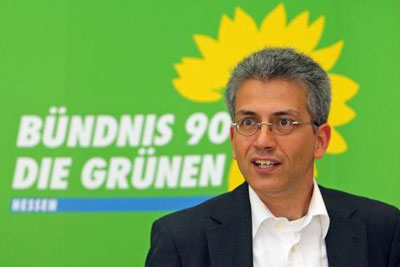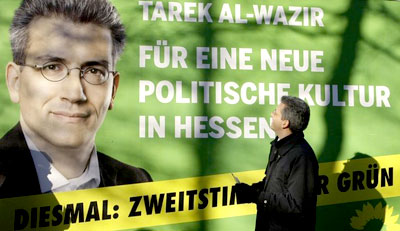Greens win highest percentage ever in a German state election
Share
†
The party’s record success came in part from its emphasis on education, helping it to broaden its appeal beyond Green voters.
 by Mike Feinstein, International Committee of the Green Party of the United States and Phil Hill, Bündnis ’90/Die Grünen (Germany)
by Mike Feinstein, International Committee of the Green Party of the United States and Phil Hill, Bündnis ’90/Die Grünen (Germany)
On January 18th, the Greens in the German state of Hesse received 13.7 percent of the vote, the highest percentage ever for Greens in any German state (Land) parliamentary election (other than city-states). In the process they almost doubled their number of representatives, winning 17 seats in the 118-member Hessian parliament (Landtag), up from 9 seats and 7.5 percent the previous election a year before. As usual, the Greens were also the only party to elect a majority of female Members of Parliament (MP) with nine out of 17. †By contrast, only 25 out of the remaining 118 from the other parties were women.

Tarek Al-Wazir: Reuters Pictures
Led by charismatic party co-chair Tarek Al-Wazir, the Hessian Greens’ platform emphasized education, climate change and green energy, gender equity, confronting poverty and increasing democracy and transparency in state government.
The partyís record success came in part from its emphasis on education, helping it to broaden its appeal beyond Green voters. On education, the Greens proposed investing more funds to increase the teacher-to-student ratio, as well as increased support for child-care, early education, and special needs students. It also advocated a shift to more site/community-based school management. This approach had already been successful for the Greens in Hesseís largest city, Frankfurt. There the Greens have been in a coalition with the Christian Democratic Union (CDU) since 2006 when the Greens received 15.3 percent in municipal elections. What lent credibility to the Greens on a statewide basis, was the fact that the Greens were in a stable governing coalition in a city that is the largest financial center in continental Europe, being home to the European Central Bank and the Frankfurt Stock Exchange.
Perhaps the most popular politician in Hesse today, Al-Wazir was born in Germany, the son of a German mother and a Yemeni father. He joined the Greens in 1989 at age 18 and was elected to the Landtag in 1995. In 2007 he was elected co-chair of the Hessian Greens and in 2008 appeared destined to be Hesseís Environmental Minister, until a proposed coalition government fell apart.
In the 2008 Hessen elections there was a virtual tie between the Social Democrats (SPD) and the ruling CDU, with the SPD receiving a mere 0.1 percent less of the popular vote. Given a chance to form the government, the SPD thought it had a coalition agreement to govern with the support of the Greens and the Left Party (Die Linke). Al-Wazir would have been Environmental Minister. The Greens hoped they could finally end the reign of CDU premier Roland Koch, who had repeatedly campaigned with blatantly anti-immigrant positions, and join sitting Green coalition governments in the city-states of Bremen (SPD-Green) and Hamburg (CDU-Green.)
But just as the coalition contract was about to be signed, several prominent Social Democrats refused to go along with the deal because it included the Left Party. The Left Party had formed in the previous few years through a merger of the former East German communist party (the Party of Democratic Socialism), which has expanded to western Germany, with defectors from the SPD.
As a result, when the proposed SPD/Green/Left government twice failed to get the necessary approval by the legislature, Koch remained acting Minister-President and new elections were called. This failure was the result of unparalleled ineptitude within the SPD ñ and the party paid a heavy price at the polls, winning less than a quarter of the vote in a state that was once its most important stronghold. As a result, Koch will continue in power at the head of a CDU/FPD government.
Despite the Greensí gains, they are still in fourth place in Hesse behind the free-market-friendly FDP ñ their chief rivals. At the national level, the two parties ñ and also the Left Party ñ are competing vehemently with very different recipes for addressing the worldwide financial meltdown, even if its effects have been much less drastic in Germany than in the US.†
As FDP Chair Guido Westerwelle put it, his party would “use its new power intelligently to rewrite the government’s fiscal stimulus to inject more tax cuts into a package dominated by infrastructure investment.” The Left Party, by contrast, supports the CDU-SPD national governmentís concept, but demands that more money be spent. The Greení alternative is a series of targeted supports, but no tax cuts, and measures which promote green industry and reward green consumption.
Since much of the governmentís legislation requires approval by the upper house of Parliament (the Bundesrat) which represents the Land governments, and since the ruling coalition has now lost its majority there because the Hessian government is based on support from the FDP, both the FDP and the Greens will be jockeying to try to “sell” their support for legislation in return for modification of laws in their respective favor. That situation will continue at least until September 2009, when federal elections are to be held. CDU Chancellor Angela Merkel will face her current foreign minister, SPD leader Frank-Walter Steinmeier, in that race.
In the first such contest, the Greens out-jockeyed the FDP ñ with the Stimulus Package, approved on January 27. The Green-backed governments in Hamburg and Bremen originally agreed to support the bill in return for support for social and environmental projects in those cities ñ sparking criticisms that the Greens were selling out the environment, since the package also included subsidies for buying new cars. The Greens did, however, achieve an improvement of the vehicle tax structure, reducing taxes on low-carbon-emitting cars, and raising them on gas-guzzlers. The FDP achieved nothing ñ i.e., no tax cuts ñ its “miracle cure” for all economic woes.
Hesse was the first state in Germany in which the Greens went into coalition government ñ back in 1985 with the SPD, with Joshcka Fischer becoming Environment and Energy Minister. Fischer’s swearing-in in sneakers, jeans and a sports jacket made quite a stir. That coalition lasted only until 1987, when the Greens refused to support licensing a new nuclear power plant and Fischer was fired (or resigned, according to the SPD).†
Hesse was also the first state where the partyís own Realo-Fundi divide over whether to participate in coalition government with ‘establishment’ parties played out in the real world. This debate had gone on in earnest since late 1982 when the Greens won seats for the first time in Hesse, with 8 percent and 9 seats. Between 1982 and 1985 neither the SDP nor CDU had a majority and while Greens did not formally support the SPD, they ‘tolerated’ them, allowing them to govern. Even this approach was controversial within the Green Party, and after the choice was made in 1985 to go into coalition, the issue remained a point of internal contention. However after being out of power for four years, a second Red-Green coalition then ruled Hesse from 1991-1999.
Fischer would ultimately become the most powerful Green in Europe, serving as Germanyís Foreign Minister during the Federal Red-Green Government that ruled the nation between 1999 and 2005.
†
†

Tarek Al-Wazir, party leader of German green party Buendnis90/Die Gruenen in the German state of Hesse poses in front of an election campaign placard in Wiesbaden December 29, 2008. Al-Wazir will start as green party’s top candidate for the upcoming state elections in Hesse, January 18. Slogan on the placard reads ‘For a new political culture in Hesse’.
Reuters Pictures




